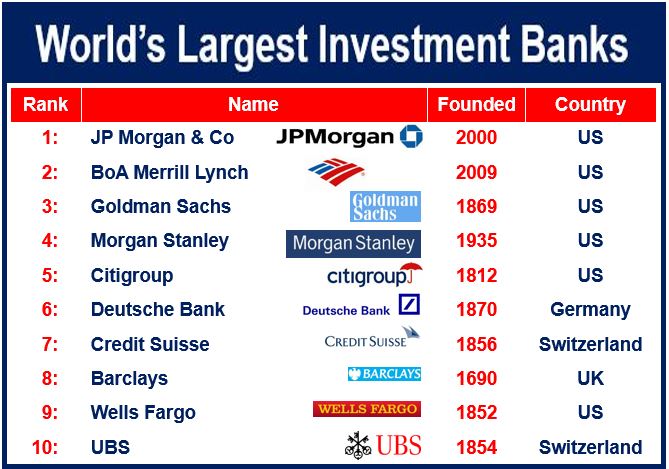An investment bank, known commonly as a merchant bank in the UK and Ireland, is a financial institution that specializes in services for companies and large investors. Its main activities include *asset management, M&A (mergers and acquisitions), research, raising capital, securities underwriting and securities trading.
* Asset management refers to looking after clients’ assets and trying to make the maximum profit possible for them.
There are three main types of banks in most countries: 1. Central banks. 2. Commercial Banks. 3. Investment Banks. Examples of central banks are the US Federal Reserve System and the Bank of England. Commercial banks take people’s, companies’ and organizations’ deposits and lend money.
Unlike commercial banks, investment banks do not take deposits.

Very few banks today are stand-alone investment banks. Most are bolted onto the side of giant financial institutions that are also major commercial banks.
Businesses use investment banks
Most large corporations make use of the services of merchant banks to manage their securities. For example, if a private company (not listed on a stock exchange) wants to launch an IPO (initial public offering), an investment bank will be used to underwrite the shares. This means that the investment bank will buy up any stocks that are not sold.
In most cases, several investment banks will cooperate when new stocks are issued, thus making the IPO less risky for each individual institution.
Merchant banks also help companies obtain debt financing by finding buyers for corporate bonds.
Many investment banks also offer brokerage services, where people and institutions interested in investing can receive advice and trade.
When large companies want to raise capital, many will turn to an investment bank.
Investment banks are generally involved in major mergers and acquisitions (M&As). They claim their services can make the whole process smoother for all involved, making sure all legal requirements are adhered to.
Investment banks also deal directly in financial markets for their own account. They make money by purchasing financial assets from one client, and then selling them on to another – and usually earn a hefty mark-up.
The advisory sections of an investment bank charge a fee for their services. Its trading divisions make money (or lose) depending on their market performance.
The world’s largest investment banks include Bank of America Merrill Lynch, Goldman Sachs, Deutsche Bank, JP Morgan, Credit Suisse, UBS, Citibank, and Barclays.
Many of the major investment banks are, in fact, giant commercial banks with large investment banking divisions.
According to nasdaq.com, investment banks are:
“Financial intermediaries who perform a variety of services, including underwriting and sale of securities, facilitating mergers and other corporate reorganizations, acting as brokers to both individual and institutional clients, and trading for their own accounts.”
The more contacts it has, the more money it can make
Investment banks with the most contacts and customers across the world are the ones that make the most money.
For example, a bank may know a pension fund in New York that wants to buy Polish mortgage debt, while its Warsaw office may know a local home loans firm.
The bank may offer to purchase the Polish client’s loans, and then sell them to its New York client through a derivative contract, but at a higher price.
During the decade leading up to the 2007/8 global financial crisis, the profits investment banks earned from these types of transactions were huge, and are starting to pick up again.
In theory, these transactions are risk-free for the banks, as it is the buyer who should end up taking all the risk.
But since the death of Lehman Brothers and other merchant banks have shown, the business may contain some serious hidden risks that surface during a financial crisis.
Conflict of interest
Employees working in the investments division of the bank are under no obligation to take their clients’ interest into account, unlike their colleagues in the advisory division.
This creates a conflict of interest, because within the bank – in its advisory division – there is confidential inside information about clients. There is the potential for the bank to allow its traders to gain access to this data and abuse it.
That is why such banks are legally required to have a ‘Chinese Wall’ that supposedly prevents data from being passed from one division to another.
Probes that followed the global financial crisis found that some investment banks had abused clients’ data, and also sold them dud investments.
Many politicians and watchdog officials would like to see some major banks split up, to address this conflict of interest problem.
Investment banking has been around for a long time
Investment banking practices date back to ancient times. In the 17th century, acceptance houses and merchant banks helped finance international trade – exporting and importing goods and services – and gathered funds for long-term investments across the world.
In the 1800s, several prominent banking partnerships blossomed, such as those created by the Barings family, the Browns and the Rothschilds, which concentrated on financing the imports of commodities for European manufacturers, as well as helping them export their finished goods across the globe.
During the American Civil War, investment banking in the United States grew considerably. Syndicate banking houses sold huge amounts of government bonds to help finance the war.
Many famous investment banks emerged in the 1800s – companies which still exist today in one form or another – such as JP Morgan and Goldman Sachs.
